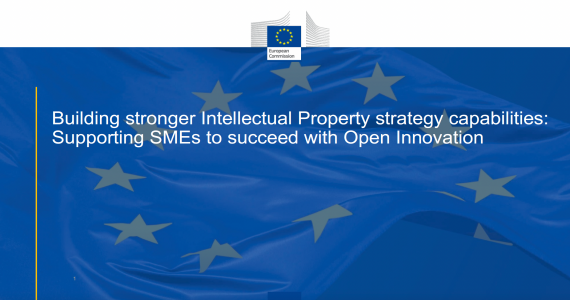IfM report highlights need for stronger IP strategy capabilities for SMEs

A new report prepared by the IfM and published by the European Commission looks at the extent to which Intellectual Property (IP) facilitates or hinders Open Innovation, particularly in relation to small- and medium-sized enterprises (SMEs).
The report, ‘Building stronger Intellectual Property strategy capabilities: Supporting SMEs to succeed with Open Innovation’ shows that despite IPs representing considerable value to SMEs, many still lack awareness, understanding and strategic thinking of IP; and measures should be taken to build stronger IP strategy capabilities in European SMEs.
SMEs frequently pioneer new technologies, products, services and software that drive innovation and economic growth. As these solutions become increasingly technologically complex, SMEs more frequently engage in collaborations with a wide range of partners, i.e. Open Innovation (OI) – activity which is promoted by the European Commission as part of its digital single market and innovation policies.
The report, which draws on the findings of 40 case studies of mostly SMEs, but also large firms, higher education institutions and public research organisations from across Europe, Australia, India, Israel, UK and US, as well as with input from a wide range of experts, explores the extent to which IP (including patents, utility models, designs, but also trade secrets, data and know-how) facilitates or hinders OI.
The findings showed that IP in many forms is a key enabler of collaboration. SMEs seek to share and gain access to different forms of IP through collaboration to pursue their business goals. However, the behaviours, processes and lacking capabilities in relation to IP can act as barriers.
Dr Frank Tietze, leader of the Innovation and Intellectual Property Management (IIPM) Lab at the IfM, and co-author of the report explains that the nature of being an SME usually means constrained resources and limited capabilities, particularly in comparison to large firm counterparts:
“Our study showed that IP is not a barrier for SMEs, but their ability to manage IP might very well be. For instance, many SMEs have a low ability to confidently negotiate IP terms for an OI contract with a larger entity. The lack of a strategic understanding of IP can cause challenges, for instance, when negotiating collaboration agreements not only with other SMEs, but particularly with partners that are organisationally different, such as large firms and HEIs.”
The report recommends that the Commission takes measures to build stronger IP strategy capabilities in European SMEs:
“Our analysis suggests that to maximise the value that SMEs can appropriate from OI, by overcoming the challenges discussed herein, SMEs need a better strategic understanding of IP. Preferably, this should be developed in-house; however, external advice should also be made available through independent IP strategy experts,” says Frank.
The report presents a set of three interrelated recommendations including people, digital infrastructure and materials focused recommendations for building IP strategy capabilities.
About the report
The full report can be downloaded here.
The report was prepared by Frank Tietze, Graham Bell, Pratheeba Vimalnath, Leonidas Aristodemou, and IfM Engage team.
About the Institute for Manufacturing (IfM)
Part of the University of Cambridge’s Department of Engineering, the IfM is a dynamic body of researchers, educators, practitioners, professionals and technical experts contributing to world-leading research and education. With a focus on manufacturing industries, the IfM creates, develops and deploys new insights into management, technology and policy.
About the Innovation and Intellectual Property Management (IIPM) Laboratory
As integral part of the Centre for Technology Management, the IIPM lab takes an engineering management (firm level) and relational perspective on IP within distributed and collaborative (open) innovation processes for emerging (manufacturing) technologies.
The Centre for Technology Management (CTM) at the IfM researches processes and practices for identifying, selecting, acquiring, exploiting and protecting technology for business benefit. CTM engages in research, teaching and practical application of new ideas based on an integrated understanding of science, engineering and business management. By working with organisations at all stages of technological development, it aims to provide comprehensive support from early-stage exploration, through multi-business unit technology strategy to end-of-life issues.










